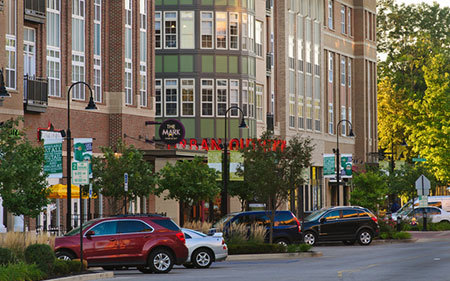University Plan
In an effort to achieve its overall aspiration of becoming a preeminent research university with a distinctive Catholic mission and an unsurpassed undergraduate education, the University of Notre Dame strives to meet the five institutional goals outlined below. Indeed, these principles are what guide all of our major academic and administrative units as they develop, implement, and regularly monitor their strategic plans.
This University-level strategic plan seeks to enhance the value of the five University goals by examining them from two perspectives: areas where they are supported with well-established strategies, and areas where we believe there is room to grow.
While the former will require only sustained effort in accord with established strategies over the course of the plan, the latter present exciting opportunities for us to utilize strategic focus, new energy, and a spirit of innovation to make Notre Dame an even stronger university.
There are 11 enhancements in total where we expect to concentrate our new efforts. This plan outlines our rationale for selecting these items and provides an initial indication of how we intend to achieve progress in each.
These principles are what guide all of our major academic and administrative units.
Ensure that our Catholic character informs all our endeavors
Catholic Character
Ensure that our Catholic character informs all our endeavors
Goal I: Ensure that our Catholic character informs all our endeavors
Context
Universities first arose in the soil of the Catholic culture of 13th-century Europe, and have existed continuously since. Notre Dame stands within and carries on that tradition.
As a Catholic university in the Holy Cross tradition, Notre Dame strives to combine a living faith that is seeking understanding with an uncompromising commitment to the search for truth through teaching and inquiry. It believes commitments to faith and reason are not only compatible, but even complementary. As Pope John Paul II wrote: “Science can purify religion from error and superstition; religion can purify science from idolatry and false absolutes. Each can draw the other into a wider world in which both can flourish.”
Our Catholic mission gives us a rich understanding of education that demands attention to the development of the whole person—“the cultivation of the heart as well as the mind,” as our founder, Rev. Edward Sorin, C.S.C., put it. Thus we strive to build a community that inspires the pursuit of truth and teaches respect, love, and service so that our learning serves the Church and the world, particularly for those who are most in need.
Enhancement Areas
-

World-Wide Dialogue
Convene and lead world-wide dialogue that serves the Church and is relevant to the Catholic intellectual tradition
Enduring Commitments
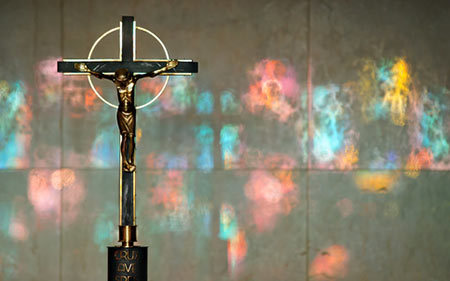
The Catholic intellectual and moral tradition does not merely add an element to our mission; it informs all we do, serving as the underlying foundation for our aspirations as a community of scholars and administrators and shaping the spirit with which we engage each other and the world. It is also the University’s point of greatest distinction from the academies of many other fine research institutions.
Offer an unsurpassed undergraduate education that nurtures the formation of mind, body, and spirit
Undergraduate Education
Offer an unsurpassed undergraduate education that nurtures the formation of mind, body, and spirit
Goal II: Offer an unsurpassed undergraduate education that nurtures the formation of mind, body, and spirit
Context
“Education is the art of bringing a young person to completeness,” said Fr. Basil Moreau, the founder of the Holy Cross order who sent Fr. Sorin to found Notre Dame. Moreau established for Notre Dame and for all Holy Cross schools the ideal of educating the whole person. These institutions devoted themselves to the intellectual, spiritual, and moral education of the students, striving to lead them into truth.
This forms the hallmark of a Notre Dame undergraduate education—rigorous intellectual training with the cultivation of moral character and spiritual formation offered in a community distinguished by faith.
Our undergraduate program is anchored in excellent teaching, a traditional strength and defining characteristic of Notre Dame. Quality teaching—the nature of the personal exchange between professor and student—will encourage students to become fellow inquirers with the faculty, giving them the ability to form their own views, test their own theories, and stand their own ground in debate.
Our University curriculum is grounded in a liberal arts core while students achieve depth of learning in a chosen major. We are committed to enhancing the education of our students through opportunities for study abroad, community-based learning, and undergraduate research.
In addition to the teaching and guidance offered by professors in the classroom, a vital part of the education at Notre Dame is provided by life in residence halls and engagement in student activities, voluntary service, and social life. The Division of Student Affairs fosters a rich community life, encourages student development through programming and its support of student groups, and nurtures the physical and emotional well-being of our students through a variety of student services.
Diversity in all its forms is valued on our campus, and we strive to create a community where all feel welcome and the gifts of each enhance everyone.
Ultimately, the Notre Dame undergraduate experience will be magnified by the power of community, people with shared ideals and engaged in a vigorous conversation, and the recognition that education at a Catholic university confers an obligation to become knowledgeable, capable, charitable—to draw on all the intellectual, spiritual, moral resources of the University to lead a rich human life inspired by the Gospel that will help unify, enlighten, and heal.
Enhancement Areas
Enduring Commitments
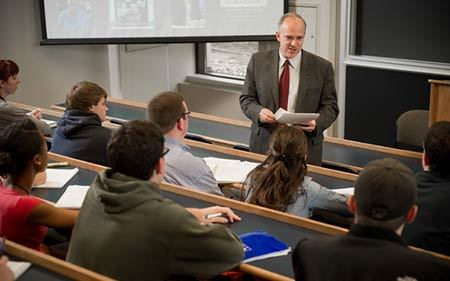
Anyone who reads Notre Dame’s Vision for Undergraduate Education will see that we aim to educate the whole person—intellectual, moral, spiritual. This means we must not only transmit worldly knowledge but also form students’ character; provide a climate hospitable to conversations about God, the good, and truth; and offer students the most profound experience of community they may ever know.
Advance human understanding through scholarship, research, and post-baccalaureate programs that seek to heal, unify, and enlighten
Research & Scholarship
Advance human understanding through scholarship, research, and post-baccalaureate programs that seek to heal, unify, and enlighten
Goal III: Advance human understanding through scholarship, research, and post-baccalaureate programs that seek to heal, unify, and enlighten
Context
The dividing line between teaching and research is never a sharp one. Good teaching is a conversation with students that is always open to novel insights; and good researchers are always ready to learn from others, whether those others are colleagues or students. Students and faculty are both engaged in inquiry whose culminating experience is discovery, a learning where no one else has previously charted a course. Teaching and research, then, are together integral parts of the core mission of any great university—the pursuit of knowledge and understanding.
Notre Dame has achieved distinction in undergraduate education, but a commitment to research has always been part of its driving vision. Rev. John Zahm, C.S.C., believed that Notre Dame’s destiny was to be a great university like the prominent German universities of his time. Fr. Burns, who became president of Notre Dame in 1919, established college deans and department chairs and hired the best faculty he could find. He wrote to a friend about a Notre Dame faculty member who was dedicated to research, saying: “My ambition is to have this kind of work going on in every department.” Fr. Hesburgh accelerated the growth in scholarship by, among many things, establishing a great research library and increasing research funding by a factor of 20. When he began his presidency in 1987, Fr. Malloy said in his inaugural address: “We must enthusiastically embrace our potential as a research institution, and we must define those areas of scholarly pursuit where we at Notre Dame are especially qualified to make a lasting contribution.”
The University of Notre Dame is now poised to build on past progress and undertake transformative steps to become even more a distinguished research university whose faculty and students contribute to our understanding of ourselves and our world and whose discoveries enhance human well-being. We believe we can be excellent in all research we undertake and truly distinguished in select areas.
By pushing forward into the unknown, by harnessing discoveries for service to the world, we are determined to become a great Catholic research university, deepening our understanding of God and creation and serving humanity.
Enhancement Areas
-
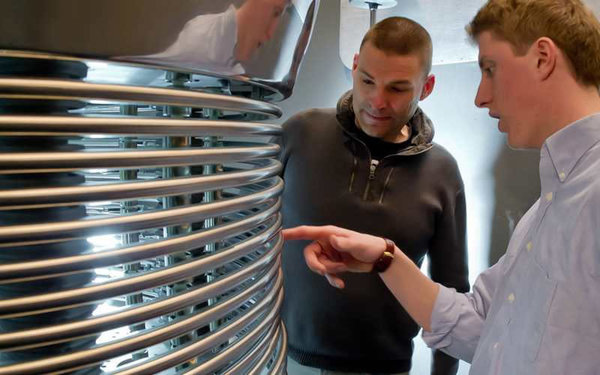
-
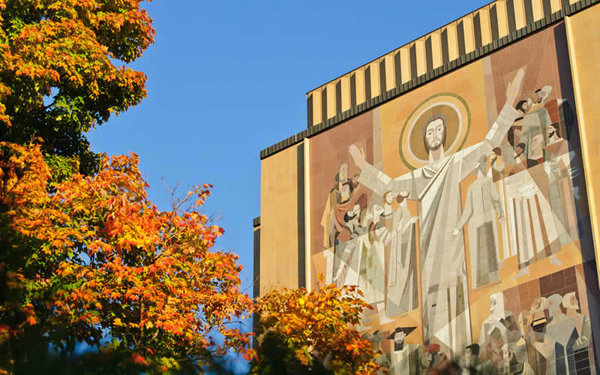
-
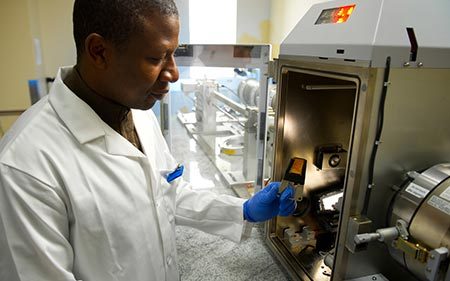
Graduate & Postdoctoral Programs
Advance the quality and success of our graduate, professional, and postdoctoral programs
-

Enduring Commitments
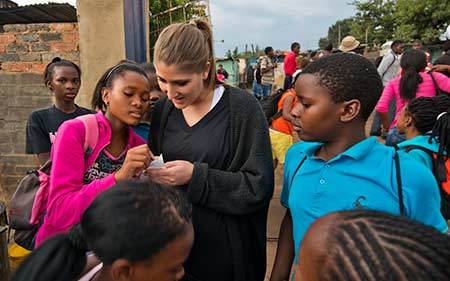
As Notre Dame strives to address major contemporary challenges, we have no more important resource than our faculty and the graduate and professional students who come here to learn from and collaborate with them. Together, Notre Dame faculty and students go beyond expanding the boundaries of what we can do through research and ask also what we should do, convinced that our ability to seek God, study the world, and serve humanity is magnified many times over by the knowledge and discovery that come with scholarly excellence.
Foster the University’s mission through superb stewardship of its human, physical, and financial resources
Stewardship
Foster the University’s mission through superb stewardship of its human, physical, and financial resources
Goal IV: Foster the University’s mission through superb stewardship of its human, physical, and financial resources
Context
The well-known Gospel passage of the parable of the talents preaches the lessons of stewardship, the duty to not only preserve what we have been given, but also multiply those talents for the benefit of all. Nothing is more important to achieving the aims of Notre Dame than faithful stewardship of the University’s resources—human, physical, and financial.
Our goal is to become a great Catholic research university. For that to happen, we must make Notre Dame a place that attracts, develops, and sustains superbly talented faculty, administrators, and staff. It also means continuing to invest in state-of-the-art facilities and infrastructure that allow these individuals to do their best work.
Like any investment, those mentioned here require appropriate levels of funding, funding that has to come from sources other than our students and their families. It is thus our benefactors who time and again answer the call and support our goal of being a source for good, and these loyal friends of the University rightfully expect to see their gifts grow.
Fortunately, we have a proud record of excellent stewardship, highlighted by a long string of balanced budgets, a triple-A bond rating, and endowment returns that consistently exceed market benchmarks.
In addition, Notre Dame staff foster an outstanding culture of service in support of students, faculty, visitors, and their fellow employees. Their many contributions range from providing for the community’s safety and security to partnering directly with faculty to advance academic excellence.
This service and stewardship is an expression of our Catholic character and is indispensable to providing an unsurpassed undergraduate education and superior graduate programs. It also acts as assurance to the Notre Dame family that we are making the most of every gift and talent we have been blessed with and the physical assets we have inherited, just as Fr. Sorin sought to do.
“I deem it one of our first duties,” he wrote in 1871, reflecting on the generosity of Notre Dame’s benefactors, “to receive, in faith and humility, each of those precious blessings and gifts as a sacred deposit … which must fructify in our hands.”
Enhancement Areas
-

Information Infrastructure
Evolve our information infrastructure to enhance research, learning, and University operations
Enduring Commitments
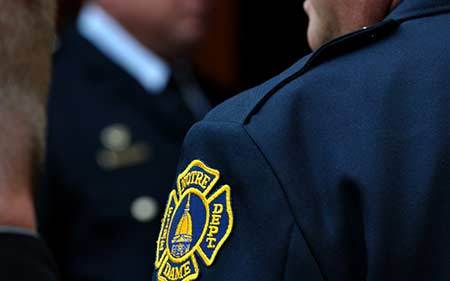
Our administrative units are critical to the fulfillment of the University’s educational mission, providing the operational expertise that allows us to meet and often exceed the day-to-day needs of students, faculty, and visitors while growing and protecting the rich array of physical and financial assets Notre Dame is privileged to possess.
Engage in external collaborations that extend and deepen Notre Dame’s impact
External Engagement
Engage in external collaborations that extend and deepen Notre Dame’s impact
Goal V: Engage in external collaborations that extend and deepen Notre Dame’s impact
Context
With Notre Dame continuing to develop in extraordinary ways, and as our faculty and students push us to ever-increasing heights of academic achievement, we must attend to the University’s reputation with a diligence befitting their performance. That is why even as we reap considerable rewards by virtue of our Catholic character and our location in a smaller, collaborative community, we are simultaneously called to ensure the world beyond our Indiana campus has not only an awareness but also an accurate understanding of who we are and the scholarship we pursue.
This intensifies the need to reach out energetically to partners in the academy, government, and industry. One way to do so is by leveraging the presence we have with Notre Dame offices and facilities in or near cities with international profiles, including Beijing, Chicago, Jerusalem, London, Rome, and Washington, D.C. Over time, we must transform Notre Dame into a global university, an intellectual leader on the world stage buoyed by the global presence of the Catholic Church and the Congregation of Holy Cross.
We also need to expand our collaboration at home, investing our time and resources with partners in South Bend and the Michiana region to support the area’s economic growth, both for the sake of the region itself and its role in making Notre Dame a leading place to teach, learn, research, and work.
Finally, we need to support the outstanding efforts of Notre Dame clubs working to nurture the close bonds within the Notre Dame family. These groups organize a wide circle of very devoted alumni and friends, whose commitment to come together, spend time and resources on their shared causes, and play a role in the success of their university is a defining aspect of Notre Dame.
Our drive to collaborate more widely in the world ultimately comes down to our mission as a Catholic university: to use our knowledge and discovery to help serve God and neighbor—and the term “neighbor,” in this age, does not only mean someone who lives nearby. To reach the full expression of our mission, Notre Dame must do its utmost to touch as many lives in as many places as possible.
Enhancement Areas
Enduring Commitments
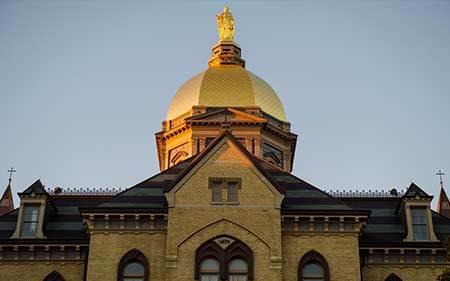
All of us who are part of this University, from students and alumni to faculty and staff, have the chance to “be” Notre Dame to the rest of the world—that is, to serve as representatives of the kind of institution we are and hope to become. These interactions foster partnerships that allow the University to maximize contributions both to higher education and society as a whole, raising the impact of our mission in the process.



